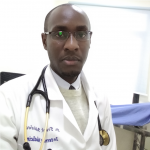GloCal Fellows 2020-2021
Albert Ayumba, Kakamega County General Hospital
 Albert Ayumba, MBChB, MMed, is a Master of Medicine degree holder from the University of Nairobi working in Kakamega County General Hospital in Kenya. His work involves the provision of specialist clinical care in obstetrics and gynecology, teaching and supervision of junior colleagues at one of the largest public referral hospitals in the western counties of Kenya. As the head of the maternity unit, Dr. Ayumba is also a member of the technical committee on elimination of mother-to-child transmission of HIV (eMTCT) and reduction of maternal deaths. He gives lectures on reproductive health at Masinde Muliro University of Science and Technology. Albert is a trainer in emergency obstetrics and neonatal care under the Liverpool School of Tropical Medicine program and medical oncology under the East African Development Bank program. He has public health experience in preventive, promotive health and disease surveillance with aspirations to build a synergized clinical and research career in emerging global health challenges.
Albert Ayumba, MBChB, MMed, is a Master of Medicine degree holder from the University of Nairobi working in Kakamega County General Hospital in Kenya. His work involves the provision of specialist clinical care in obstetrics and gynecology, teaching and supervision of junior colleagues at one of the largest public referral hospitals in the western counties of Kenya. As the head of the maternity unit, Dr. Ayumba is also a member of the technical committee on elimination of mother-to-child transmission of HIV (eMTCT) and reduction of maternal deaths. He gives lectures on reproductive health at Masinde Muliro University of Science and Technology. Albert is a trainer in emergency obstetrics and neonatal care under the Liverpool School of Tropical Medicine program and medical oncology under the East African Development Bank program. He has public health experience in preventive, promotive health and disease surveillance with aspirations to build a synergized clinical and research career in emerging global health challenges.
Project
Comparison of retinovascular findings in HIV infected pregnancies on highly active antiretroviral treatment (HAART) and uninfected pregnancies complicated with preeclampsia and severe features
Hypertensive retinopathy complicates about 40-100% of pregnancies with hypertensive disorders per the UNAIDS report for Kenya of 2018. Approximately 910,000 (65%) of the 1.4 million adults living with HIV were women. In Kenya, 91% of pregnant mothers accessed antiretroviral therapy for prevention of mother-to-child transmission (PMTCT). Most patients with these morbidities report mild to no visual complaints, yet there are possible long-term effects associated with retinovascular changes in these settings. Digital fundus photography can be applied in both non-acute and acute clinical setups and additionally in large population screening programs. Availability of treatment options for diagnosed new or severe HIV and hypertension associated microvasculopathy could significantly curtail rapid progression and potential long-term effects.
Mentors: Stephanie Gaw, MD, PhD (UCSF), Moses M. Obimbo, MD, PhD (University of Nairobi, Kenya), Jeremy Keenan, MD, MPH (UCSF)
Pamela Chacón Uscamaita, Universidad Peruana Cayetano Heredia (UPCH)
 Pamela Chacón, DDS, is a Master's candidate in Epidemiological Research at UPCH sponsored by a NIH Fogarty grant. She works in Emerge, the Emerging Diseases and Climate Change Research Unit at UPCH, where she improved her quantitative methods knowledge after applying it in data analyses of randomized clinical trials and epidemiological studies. Since 2017, she has been a member of the Basic Stomatological Sciences and Public Health Research Group at Universidad Nacional Mayor de San Marcos, where she participates in oral public health and epidemiological research, including novel topics such as the study of the role of the oral microbiome. Dr. Chacón is interested in the implementation of oral health prevention programs as part of primary care to reduce the burden of and health disparities in dental caries. Her long-term goal is to become an independent investigator in global health and develop adequate methodologies to implement and evaluate oral health interventions.
Pamela Chacón, DDS, is a Master's candidate in Epidemiological Research at UPCH sponsored by a NIH Fogarty grant. She works in Emerge, the Emerging Diseases and Climate Change Research Unit at UPCH, where she improved her quantitative methods knowledge after applying it in data analyses of randomized clinical trials and epidemiological studies. Since 2017, she has been a member of the Basic Stomatological Sciences and Public Health Research Group at Universidad Nacional Mayor de San Marcos, where she participates in oral public health and epidemiological research, including novel topics such as the study of the role of the oral microbiome. Dr. Chacón is interested in the implementation of oral health prevention programs as part of primary care to reduce the burden of and health disparities in dental caries. Her long-term goal is to become an independent investigator in global health and develop adequate methodologies to implement and evaluate oral health interventions.
Project
Integration of dental referrals into primary care services in Piura and Lima, Peru
Dental caries are extremely common in Peru with a prevalence of 86% in children aged 3-15 years, and early intervention can have an important role in preventing dental caries by acting before the dentition. The Peruvian Ministry of Health recommends that the first visit to the dentist must take place in the first year of life for children. However, mothers mostly take their children to health facilities with dental care services when they already have oral diseases. We hypothesize that prevention through dental service referrals from pre- and post-natal care professionals will improve hygiene and oral care, as well as dental services use later in life, leading to improved oral health. Dr. Chacón will conduct a proof-of-concept intervention to assess the feasibility of a short-term oral health program. This will require improving knowledge and perceptions of dental health among pregnant women, mothers of children y than three months old, and primary care personnel.
Mentors: Francisco Ramos-Gómez, DDS, MS, MPH (UCLA), Andrés G. Lescano, PhD, MHS (UPCH), Elisa Juárez-Chávez, MD, MSPH (UPCH)
Abigail Cortez, UCLA
 Abigail Cortez, MD is an orthopedic surgery resident at UCLA with an interest in hand and trauma surgery. She received her undergraduate degree with honors at UC Berkeley, where she studied Molecular and Cell Biology with an emphasis in Neurobiology. She attended medical school at UCSF, where she was involved in student groups and extra-curricular activities that focused on medical student education and public health. While at UCSF, she completed the Clinical & Translational Research Pathway in the Department of Orthopedics, studying infection outcomes after the implementation of a screen-and-treat program for Staphylococcus aureus nasal colonization in patients receiving operative fixation for traumatic fractures. She presented her work as a podium presentation at the 2017 Orthopedic Trauma Association annual meeting. Abigail is interested in expanding her interest and skills in trauma research into the growing field of global orthopedics.
Abigail Cortez, MD is an orthopedic surgery resident at UCLA with an interest in hand and trauma surgery. She received her undergraduate degree with honors at UC Berkeley, where she studied Molecular and Cell Biology with an emphasis in Neurobiology. She attended medical school at UCSF, where she was involved in student groups and extra-curricular activities that focused on medical student education and public health. While at UCSF, she completed the Clinical & Translational Research Pathway in the Department of Orthopedics, studying infection outcomes after the implementation of a screen-and-treat program for Staphylococcus aureus nasal colonization in patients receiving operative fixation for traumatic fractures. She presented her work as a podium presentation at the 2017 Orthopedic Trauma Association annual meeting. Abigail is interested in expanding her interest and skills in trauma research into the growing field of global orthopedics.
Project
Long-term outcomes after treatment of open tibia fractures with external fixation versus intramedullary nailing at the Muhimbili Orthopedic Institute in Dar es Salaam, Tanzania
The tibial shaft is the most common site of long-bone and open fractures. It is reasonable to assume that the incidence of tibial fractures and disability is rising due to a well-documented increase in road traffic injury in LMICs. The optimal method of definitive stabilization remains unclear. While studies in high-income countries recommend intramedullary nailing (IMN) over external fixation (EF), we do not know whether these findings apply to similarly injured patients in LMICs using locally available facilities and implants. Our previous randomized controlled trial comparing these two treatments was the first to provide high-quality information on the outcomes of open tibial fractures treated with IMN or EF. The current study will lengthen follow-up of this cohort up to five years. The expanded follow-up will provide clinical, radiographic, and quality of life outcomes that are unprecedented in any prospectively followed sample of patients with open tibia fractures.
Mentors: Saam Morshed, MD, PhD, MPH (UCSF), Billy Haonga, MD (Muhimbili Orthopaedic Institute), Hendry Sawe, MD (Muhimbili University of Health and Allied Sciences)
Dirk Davis, UC San Diego
 Dirk A. Davis, PhD, MPH, is a public health scientist and post-doctoral fellow at the University of California San Diego. His research focuses on global LGBTQ health, with an emphasis on the intersections of HIV, mental health and violence in Latin America. Dr. Davis has worked in Central America and the Spanish-speaking Caribbean in collaboration with various governmental, academic, and community-based organizations to improve the overall health and well-being of sexual and gender minorities since 2010. Dr. Davis received his PhD and MPH from the Department of Health Behavior at the University of North Carolina at Chapel Hill where he also served as an NIH NIAID T32 Research Training Fellow in HIV and STDs; he received his BA in Spanish and Latin American Studies from the University of North Carolina at Charlotte.
Dirk A. Davis, PhD, MPH, is a public health scientist and post-doctoral fellow at the University of California San Diego. His research focuses on global LGBTQ health, with an emphasis on the intersections of HIV, mental health and violence in Latin America. Dr. Davis has worked in Central America and the Spanish-speaking Caribbean in collaboration with various governmental, academic, and community-based organizations to improve the overall health and well-being of sexual and gender minorities since 2010. Dr. Davis received his PhD and MPH from the Department of Health Behavior at the University of North Carolina at Chapel Hill where he also served as an NIH NIAID T32 Research Training Fellow in HIV and STDs; he received his BA in Spanish and Latin American Studies from the University of North Carolina at Charlotte.
Project
The intersections of violence, mental health, and HIV among Indigenous gay, bisexual and other men who have sex with men in Guatemala
Gay, bisexual, and other men who have sex with men (GBMSM) are disproportionately affected by HIV in Guatemala. Although 44% of Guatemalans identify as Indigenous, there exists almost no evidence of the unique health experiences of Indigenous GBMSM. Two factors that may influence HIV-related behaviors in this group are poor mental health and interpersonal violence. In Guatemala, where violence is widespread and is partly the legacy of a 36-year civil war in which over 200,000 Guatemalans, mostly Indigenous, were killed or disappeared, Indigenous GBMSM may be especially affected by violence. As part of the GloCal Fellowship, Dr. Davis will use qualitative methods to explore how experiences of violence over the life course influence mental health and HIV-related behaviors among Indigenous GBMSM in Guatemala. Findings will provide foundational evidence to inform HIV, violence and mental health intervention design for this population.
Mentors: Kimberly Brouwer, PhD (UC San Diego), Sara Estrada, PhD (Universidad del Valle de Guatemala), Roberto Orellana, PhD (Portland State University)
Chipo Gwanzura, University of Zimbabwe
 Chipo Gwanzura, MBChB, DipHIVMan, MMed (O&G), is an Obstetrician Gynecologist in the Department of Obstetrics and Gynecology at the University of Zimbabwe College of Health Sciences (UZCHS). She has just completed her MMed as well as her Fellowship of College of Obstetricians and Gynaecologists (FCOG) of the Colleges of Medicine of South Africa. Dr. Gwanzura is the vice president of the World Association of Trainees in Obstetrics and Gynecology. Her preliminary work on the use of Tranexamic acid as prophylaxis at elective caesarean section showed a trend towards efficacy, and she hopes to build on this study during her fellowship. Dr. Gwanzura is a budding researcher whose career goal is to contribute to finding solutions to reduce the burden of maternal morbidity and mortality in Zimbabwe, Sub-Saharan Africa and globally.
Chipo Gwanzura, MBChB, DipHIVMan, MMed (O&G), is an Obstetrician Gynecologist in the Department of Obstetrics and Gynecology at the University of Zimbabwe College of Health Sciences (UZCHS). She has just completed her MMed as well as her Fellowship of College of Obstetricians and Gynaecologists (FCOG) of the Colleges of Medicine of South Africa. Dr. Gwanzura is the vice president of the World Association of Trainees in Obstetrics and Gynecology. Her preliminary work on the use of Tranexamic acid as prophylaxis at elective caesarean section showed a trend towards efficacy, and she hopes to build on this study during her fellowship. Dr. Gwanzura is a budding researcher whose career goal is to contribute to finding solutions to reduce the burden of maternal morbidity and mortality in Zimbabwe, Sub-Saharan Africa and globally.
Project
Efficacy of Tranexamic acid in preventing postpartum hemorrhage after caesarean section
Postpartum hemorrhage (PPH) is a significant cause of maternal mortality and is responsible for 25% of all maternal deaths globally. Virtually all of these deaths (99%) occur in developing countries, with 66% occurring in Sub-Saharan Africa. The maternal mortality ratio (MMR) for Zimbabwe is estimated at 651 deaths per 100,000 births which is extremely high compared to the target worldwide MMR of less than 70 per 100,000 by 2030. PPH is the second most common cause of maternal death in Zimbabwe. Caesarean births are associated with greater blood loss than vaginal deliveries. Worldwide there has been an increase in the Caesarean section rate. Endeavors to prevent and decrease morbidity and mortality due to PPH by using interventions such as uterotonics and Tranexamic acid can assist in addressing the profound inequities in maternal and perinatal health globally. Dr. Gwanzura's study aims to assess the effectiveness of Tranexamic acid in preventing PPH after caesarean delivery.
Mentors: Dilys Walker, MD (UCSF), Zvavahera Mike Chirenje, MD, FRCOG (UZCHS), E. Pamela Wright, PhD (Vrije Universiteit Amsterdam)
Halie Kampman, UC Santa Cruz
 Halie Kampman, MA, is a doctoral candidate in environmental studies at the University of California, Santa Cruz. She received her undergraduate degree from the University of California, Los Angeles in international development studies and a master’s degree in development studies at the Graduate Institute of International and Development Studies, Switzerland. Since 2014, she has conducted qualitative research on food systems and human health in sub-Saharan Africa. Her master’s research explored the recycling of treated wastewater for irrigation in peri-urban farms in Senegal. Following this, she worked as a consultant at the International Food Policy Research Institute. There she contributed to a Senegal case study addressing how action for nutrition may be scaled up. While in her doctoral program she has been a fellow at the UCSC Science and Justice Research Center and the UC Global Food Initiative, and conducted research in Senegal as a Fulbright student.
Halie Kampman, MA, is a doctoral candidate in environmental studies at the University of California, Santa Cruz. She received her undergraduate degree from the University of California, Los Angeles in international development studies and a master’s degree in development studies at the Graduate Institute of International and Development Studies, Switzerland. Since 2014, she has conducted qualitative research on food systems and human health in sub-Saharan Africa. Her master’s research explored the recycling of treated wastewater for irrigation in peri-urban farms in Senegal. Following this, she worked as a consultant at the International Food Policy Research Institute. There she contributed to a Senegal case study addressing how action for nutrition may be scaled up. While in her doctoral program she has been a fellow at the UCSC Science and Justice Research Center and the UC Global Food Initiative, and conducted research in Senegal as a Fulbright student.
Project
Food landscapes in West Africa: navigating policy and programs for changing nutrition realities
Increasingly, people in Ghana are said to feel the effects of the double burden of malnutrition, defined as the simultaneous manifestation of both undernutrition and overnutrition. While action for nutrition across sub-Saharan Africa has long addressed undernutrition, overnutrition presents a new and challenging paradox. From an institutional perspective, this research explores how government, non-governmental organizations and research institutions address the double burden through policy and programs. This includes efforts to modify eating habits through the promotion of biofortified crops bred for higher micronutrient content, community gardens for diet diversity and educational nutritional awareness campaigns. From a community perspective, the research explores people’s interactions with nutrition interventions, as well as their everyday and embodied experiences with growing, preparing and consuming food. This research is paired with a comparative study in Senegal.
Mentors: Madeleine Fairbairn, PhD (UC Santa Cruz), Seth Adu-Afarwuah, BSc, PhD (University of Ghana), Charlotte Biltekoff, PhD (UC Davis)
Asteria Kimambo, Muhimbili University of Health and Allied Sciences (MUHAS)
 Asteria H Kimambo, MD, MMed is a lecturer in the Department of Anatomical Pathology at Muhimbili University of Health and Allied Sciences (MUHAS). She received her MD and MMed in Anatomic Pathology from MUHAS. She is a key member of the MUHAS-ORCI-UCSF Cancer Collaboration and has been actively engaged in research aimed at building capacity in cytopathology. Her involvement in this collaboration has allowed her develop skills in fine needle aspiration biopsy technique, immunohistochemistry, and laboratory management, which has greatly impacted her decision to pursue a career in research. Dr. Kimambo’s primary research interests involve improving diagnostic testing for breast cancer to reduce delays in initiating treatment and positively impact patient care.
Asteria H Kimambo, MD, MMed is a lecturer in the Department of Anatomical Pathology at Muhimbili University of Health and Allied Sciences (MUHAS). She received her MD and MMed in Anatomic Pathology from MUHAS. She is a key member of the MUHAS-ORCI-UCSF Cancer Collaboration and has been actively engaged in research aimed at building capacity in cytopathology. Her involvement in this collaboration has allowed her develop skills in fine needle aspiration biopsy technique, immunohistochemistry, and laboratory management, which has greatly impacted her decision to pursue a career in research. Dr. Kimambo’s primary research interests involve improving diagnostic testing for breast cancer to reduce delays in initiating treatment and positively impact patient care.
Project
An implementation strategy for a point-of-care breast cancer biomarker assay in Tanzania
Breast cancer biomarker assessment is critical for determining prognosis and optimal treatment of breast cancer patients. In Tanzania, hormone receptor testing can only currently be performed using immunohistochemistry on surgical specimens, which is subject to suboptimal tissue fixation and needs highly trained laboratory personnel. A pilot study to validate a point-of-care breast cancer biomarker assay using fine needle aspiration biopsy (FNAB) specimens is underway at Muhimbili National Hospital (MNH) and shows high concordance with conventional testing and shorter turnaround time. Dr. Kimambo’s current project aims to create a systematic and sustainable strategy for the implementation of a streamlined workflow that partners fine needle aspiration biopsy and the point-of-care test. This workflow would allow for breast cancer diagnosis and hormone receptor testing results to be rendered in a single clinic visit. Dr. Kimambo’s will also perform a cost-analysis of this new technology.
Mentors: Dianna Ng, MD (UCSF), Edda Vuhahula, DDS, PhD (MUHAS), Katherine Van Loon, MD, MPH (UCSF)
Fiorella Krapp López, Universidad Peruana Cayetano Heredia (UPCH)
 Fiorella Krapp, MD, MS, is a Junior Faculty member at Universidad Peruana Cayetano Heredia (UPCH) and a researcher at the Instituto de Medicina Tropical Alexander von Humboldt (IMTAvH) in Lima, Peru. Dr. Krapp received her MD from UPCH and then completed her Internal Medicine residency and Infectious Diseases fellowship at Washington University School of Medicine in St. Louis and Northwestern University, respectively. She also holds a Master’s degree in Clinical Investigation from Northwestern University and received training in translational research focused on the genomic characterization of carbapenem-resistant Enterobacteriaceae at the Alan Hauser Laboratory in Northwestern University. In 2017, she returned to Peru where she currently is pursuing a PhD in Biomedical Sciences. Her doctoral research focuses on studying the epidemiology, genomic characteristics and mechanisms of antimicrobial resistance of Gram-negative bacteria in Peru.
Fiorella Krapp, MD, MS, is a Junior Faculty member at Universidad Peruana Cayetano Heredia (UPCH) and a researcher at the Instituto de Medicina Tropical Alexander von Humboldt (IMTAvH) in Lima, Peru. Dr. Krapp received her MD from UPCH and then completed her Internal Medicine residency and Infectious Diseases fellowship at Washington University School of Medicine in St. Louis and Northwestern University, respectively. She also holds a Master’s degree in Clinical Investigation from Northwestern University and received training in translational research focused on the genomic characterization of carbapenem-resistant Enterobacteriaceae at the Alan Hauser Laboratory in Northwestern University. In 2017, she returned to Peru where she currently is pursuing a PhD in Biomedical Sciences. Her doctoral research focuses on studying the epidemiology, genomic characteristics and mechanisms of antimicrobial resistance of Gram-negative bacteria in Peru.
Project
Genomic characterization of antimicrobial resistance mechanisms and the genetic diversity of K. pneumoniae blood isolates across time and regions in Peru
Peru has one of the highest rates of antimicrobial resistance (AMR) to commonly used antibiotics among Gram-negative bacteria in Latin America. This project aims to perform a detailed characterization of the genetic diversity and molecular characteristics of Klebsiella pneumoniae blood isolates recovered from hospitalized patients in Peru between 2008 and 2019. These isolates have been collected through a hospital-based network that includes 15 hospitals from 13 different regions within Peru. By using whole genome sequencing, this project will explore the mechanisms of resistance to third generation cephalosporins, carbapenems, quinolones and colistin among the isolates identified to have any of these resistance profile.
Mentors: Victor Nizet, MD (UC San Diego), Theresa Ochoa Woodell, MD (IMTAvH, UPCH), Omai Garner, PhD (UCLA)
Frank Mulindwa, Makerere University, Infectious Diseases Institute (IDI)
 Frank Mulindwa, MBChB, MMed, is currently a research scholar in the capacity building program in the Infectious Diseases Institute (IDI) in Uganda. He works as a hospitalist in the Ugandan capital, Kampala. He holds a bachelor’s degree in medicine and surgery and a master’s degree in internal medicine, both from Makerere University. After receiving his medical degree, Frank worked as a clinician in an HIV clinic with more than 4,500 patients caring for both ambulatory and admitted patients. He also coordinated multi-drug resistant tuberculosis surveillance in southwestern Uganda. Following a global health elective with the Yale New Haven Hospital Neurology service where he spent most of the time with the stroke and vascular team, he came to appreciate the volume of resources needed to rehabilitate patients after neurovascular accidents. This experience informed his research interest in determining the burden and preventive strategies of neurovascular diseases in people living with HIV in resource-limited settings.
Frank Mulindwa, MBChB, MMed, is currently a research scholar in the capacity building program in the Infectious Diseases Institute (IDI) in Uganda. He works as a hospitalist in the Ugandan capital, Kampala. He holds a bachelor’s degree in medicine and surgery and a master’s degree in internal medicine, both from Makerere University. After receiving his medical degree, Frank worked as a clinician in an HIV clinic with more than 4,500 patients caring for both ambulatory and admitted patients. He also coordinated multi-drug resistant tuberculosis surveillance in southwestern Uganda. Following a global health elective with the Yale New Haven Hospital Neurology service where he spent most of the time with the stroke and vascular team, he came to appreciate the volume of resources needed to rehabilitate patients after neurovascular accidents. This experience informed his research interest in determining the burden and preventive strategies of neurovascular diseases in people living with HIV in resource-limited settings.
Project
Glucose metabolism changes in HIV patients starting dolutegravir based antiretroviral treatment in Uganda
With the longevity of antiretroviral therapy, the burden of non-communicable diseases (NCDs) has been on the rise in HIV positive patients. Compared to communicable diseases, diagnosis and treatment of NCDs is much more complex and costly, even more so in resource-limited settings. This underscores the need for active surveillance and prevention of NCDs before overt disease. In 2016, the WHO adopted Dolutegravir (DTG) as first and second line therapy and Uganda adopted the strategy in 2018 with active transitioning of patients on first line ART to DTG containing regimens. Despite the demonstrated efficacy and good side effect profile, DTG has been associated with increased incident and worsening diabetes, which is likely to add to the already increasing NCD burden. The aim of the study is to demonstrate if there is temporality between changes in insulin resistance, pancreatic beta cell function, blood glucose and duration on DTG in an ART naïve cohort on DTG for 48 weeks.
Mentors: Jean-Marc Schwarz, MD (UCSF), Barbara Castelnuovo, MBChB, MS, PhD, (IDI), Joshua Rhein, MD (University of Minnesota)
Lucy Mupfumi, University of Botswana
 Lucy Mupfumi, BSc, MPhil, PhD is an infectious disease research scientist with interests in the epidemiology of HIV and tuberculosis (TB) in HIV-prevalent settings in sub-Saharan Africa. She recently completed her PhD at the University of Botswana focusing on the incidence of TB in the Botswana national antiretroviral (ART) program and the identification of biomarkers of early TB treatment response. For her master’s degree, Lucy led one of the first clinical trials evaluating the impact of Xpert MTB/RIF in HIV-infected individuals on ART in Zimbabwe. It was during that time that she was first exposed to biostatistics and epidemiology through a Fogarty AIDS International Training and Research Program at UC Berkeley, where she spent two months in the epidemiology department under Professor Art Reingold. During her GloCal fellowship year, Lucy will develop an epidemiologic model to understand the changing transmission of TB with expanded HIV treatment in Botswana.
Lucy Mupfumi, BSc, MPhil, PhD is an infectious disease research scientist with interests in the epidemiology of HIV and tuberculosis (TB) in HIV-prevalent settings in sub-Saharan Africa. She recently completed her PhD at the University of Botswana focusing on the incidence of TB in the Botswana national antiretroviral (ART) program and the identification of biomarkers of early TB treatment response. For her master’s degree, Lucy led one of the first clinical trials evaluating the impact of Xpert MTB/RIF in HIV-infected individuals on ART in Zimbabwe. It was during that time that she was first exposed to biostatistics and epidemiology through a Fogarty AIDS International Training and Research Program at UC Berkeley, where she spent two months in the epidemiology department under Professor Art Reingold. During her GloCal fellowship year, Lucy will develop an epidemiologic model to understand the changing transmission of TB with expanded HIV treatment in Botswana.
Project
Modeling the impact of long-term antiretroviral therapy on tuberculosis incidence
Although the benefits of antiretroviral therapy (ART) in reducing the incidence of TB are well-described, the incidence of TB remains higher in HIV-infected individuals on ART compared to HIV-uninfected individuals. This project aims to predict the trajectory of TB incidence in Botswana with early ART initiation. In an analysis of patients initiating ART and followed up over time between 2011 and 2015, Lucy and colleagues showed an overall incidence rate of 1.9/100 py, increasing to 3.0/100 py in the first year of ART (Mupfumi L, et al. AIDS, 2019). A key question from this analysis was how this incidence compares to the population-level incidence and what the impact of early ART initiation would be on this reported incidence. Therefore, building on this work, Lucy will develop a mathematical model to predict 1) the impact of community ART coverage on TB incidence and 2) the trajectory of the TB epidemic with early ART initiation alone or in combination with other strategies (e.g. TB preventive treatment).
Mentors: Jeffrey Klausner, MD, MPH (UCLA), Sanghyuk Shin, PhD (UC Irvine), Chelsea Morroni, MD, MPH, PhD (Botswana UPenn Partnership), Chawangwa Modongo, MD (Botswana UPenn Partnership)
Susan Thomas, St. John's Research Institute (SJRI)
 Susan Thomas, MPhil, PhD, is a Clinical Psychologist working in the Division of Mental Health and Neurosciences, St. John’s Research Institute (SJRI), Bangalore. She received her MPhil and PhD in Clinical Psychology from the National Institute of Mental Health and Neurosciences, Bangalore. She completed a fellowship with the Department of Science and Technology, Government of India, before joining SJRI, where she coordinates and manages research activities and provides training in psychological assessments and interventions. She has worked in studies that examined the effects of nutritional supplementation and depression in pregnancy on child outcomes, an intervention study on domestic violence and a large NIH-funded study on integrating mental health interventions in rural primary health centers. Her research interest is in examining the mental health needs of women, particularly during the perinatal period and its impact on child health.
Susan Thomas, MPhil, PhD, is a Clinical Psychologist working in the Division of Mental Health and Neurosciences, St. John’s Research Institute (SJRI), Bangalore. She received her MPhil and PhD in Clinical Psychology from the National Institute of Mental Health and Neurosciences, Bangalore. She completed a fellowship with the Department of Science and Technology, Government of India, before joining SJRI, where she coordinates and manages research activities and provides training in psychological assessments and interventions. She has worked in studies that examined the effects of nutritional supplementation and depression in pregnancy on child outcomes, an intervention study on domestic violence and a large NIH-funded study on integrating mental health interventions in rural primary health centers. Her research interest is in examining the mental health needs of women, particularly during the perinatal period and its impact on child health.
Project
Feasibility of training primary health workers to identify antenatal depression
The prevalence rate of antenatal depressive symptoms in India is high. Antenatal depression is associated with adverse obstetric outcomes and can lead to short-term and long-term maternal and child mental health problems. Incorporating a formal assessment for depression into perinatal care can improve treatment engagement and outcomes. However, lack of time and training often results in low rates of identification of depression in resource poor settings. In India, with a significant lack of trained mental health professionals, task shifting by training primary health-care workers could help identify antenatal depression at an early stage and refer those who need further help to a specialist. This study aims to test the feasibility of training obstetric staff in primary health centers in the screening and assessment of antenatal depressive symptoms.
Mentors: Maria Ekstrand, PhD (UCSF), K. Srinivasan, MD (SJRI), Tinku Thomas, PhD, MSc (SJRI)
Fulbright-Fogarty Fellows
Emily Nuss, University of Massachusetts Medical School
 Emily Nuss is a rising 4th year medical student at University of Massachusetts Medical School. After graduating from Middlebury College, she completed a Princeton in Latin America Fellowship in Guatemala. She then worked as a Clinical Research Assistant at Beth Israel Deaconess Medical Center (BIDMC) in Boston on a study focused on how racial, socioeconomic, and environmental stress can lead to epigenetic changes that contribute to preterm birth. At UMASS Medical School, Emily applied to be a member of the Population Urban Rural Community Health program. She has also been involved in a community-driven service project aimed at reducing the disparity in infant mortality rates among the Black and Latinx populations in Worcester. Emily plans to pursue a career in either Family Medicine or OBGYN. She is committed to working with underserved patients both in the U.S. and globally, and aims to combine clinical care with a public health approach to reduce health disparities.
Emily Nuss is a rising 4th year medical student at University of Massachusetts Medical School. After graduating from Middlebury College, she completed a Princeton in Latin America Fellowship in Guatemala. She then worked as a Clinical Research Assistant at Beth Israel Deaconess Medical Center (BIDMC) in Boston on a study focused on how racial, socioeconomic, and environmental stress can lead to epigenetic changes that contribute to preterm birth. At UMASS Medical School, Emily applied to be a member of the Population Urban Rural Community Health program. She has also been involved in a community-driven service project aimed at reducing the disparity in infant mortality rates among the Black and Latinx populations in Worcester. Emily plans to pursue a career in either Family Medicine or OBGYN. She is committed to working with underserved patients both in the U.S. and globally, and aims to combine clinical care with a public health approach to reduce health disparities.
Project
Household Air Pollution and Health (HAPIN) trial
Air pollution significantly contributes to morbidity and mortality worldwide. While this has been established in the existing literature, there is a need for additional investigation on how household air pollution impacts pregnancy and child development outcomes. Many low-resource countries cook predominately with open fire cookstoves, which results in widespread exposure to smoke. The Universidad del Valle de Guatemala’s (UVG) Household Air Pollution and Health (HAPIN) trial is a multi-centered randomized control trial assessing the effects of household air pollution on maternal and child health outcomes. Emily will work with the branch of the HAPIN trial focused on child health, including stunting and cognitive development. She will assist in capacity building, working with nurses to ensure that there is a consistent and accurate method of collecting data from questionnaires as well as of conducting growth monitoring, physical exam, and developmental exam.
Mentors: Lisa Thompson, RN, FNP-BC, MS, PhD, FAAN (Emory University), Anaité Díaz (Universidad del Valle de Guatemala) John P. McCracken, MPH, PhD (Universidad del Valle de Guatemala)
Tatiana Petrovick, University of Massachusetts Medical School
 Tatiana Petrovick is a medical student attending the University of Massachusetts Medical School. She received her Bachelor’s degree in Biochemistry from Boston College in 2015. Prior to entering medical school, she worked in Guatemala and worked on projects related to primary care delivery, maternal and child health, and diabetes education in rural areas. While at the University of Massachusetts, Tatiana has been involved in the Global Health Track and spent a summer in Bolivia working with a non-governmental organization that advocates for improved health and human rights for LGBTQ+ and HIV positive populations. Additionally, she has been involved in the Population-Based Urban and Rural Community Health (PURCH) Track, which is a longitudinal, four-year program focused on the health of medically underserved populations. Tatiana is interested in researching women’s health in low-resource areas and underserved populations, particularly in the region of Latin America.
Tatiana Petrovick is a medical student attending the University of Massachusetts Medical School. She received her Bachelor’s degree in Biochemistry from Boston College in 2015. Prior to entering medical school, she worked in Guatemala and worked on projects related to primary care delivery, maternal and child health, and diabetes education in rural areas. While at the University of Massachusetts, Tatiana has been involved in the Global Health Track and spent a summer in Bolivia working with a non-governmental organization that advocates for improved health and human rights for LGBTQ+ and HIV positive populations. Additionally, she has been involved in the Population-Based Urban and Rural Community Health (PURCH) Track, which is a longitudinal, four-year program focused on the health of medically underserved populations. Tatiana is interested in researching women’s health in low-resource areas and underserved populations, particularly in the region of Latin America.
Project
Quality Control and Local Capacity Building as Part of the HAPIN Trial in Guatemala
In many low and middle-income countries, families will often cook over an open fire in the home instead of over a gas stove. This can expose household members to air pollutants and cause numerous negative health effects, including poor birth outcomes, respiratory infections, and heart disease. The HAPIN Trial will study the effect of gas cooking stove and fuel distribution on these health outcomes. The study has recruited 3,200 households in Guatemala, India, Peru, and Rwanda including pregnant women, their infants, and older adult women and randomly assigned half of them to receive a gas cookstove and fuel. Participating households will be followed for 18 months with monitoring of stove use and personal exposure to household air pollution, as well as assessments of health outcomes. The goal of this project is to conduct quality control on the health assessments portion of the study and identify potential areas of capacity building for local staff.
Mentors: Lisa Thompson, RN, FNP, PhD (Emory University), Anaité Díaz Artiga, PhD (Universidad del Valle Guatemala), John McCracken, PhD (Universidad del Valle Guatemala)
